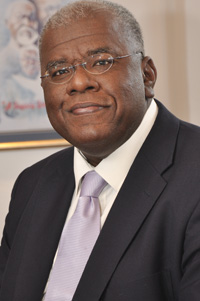Latest News Archive
Please select Category, Year, and then Month to display items
05 June 2018
Photo Supplied
 Archaeological excavations in the Wonderwerk Cave, north of Kuruman in the Northern Cape.
Archaeological excavations in the Wonderwerk Cave, north of Kuruman in the Northern Cape.
Research fellow Dr Lloyd Rossouw from the Department of Plant Sciences at the University of the Free State (UFS) recently published an article in the Nature Ecology and Evolution journal with Dr Michaela Ecker from the University of Toronto as lead author, and Dr James Brink, research fellow at the UFS Centre for Environmental Management. The findings described in “The palaeoecological context of the Oldowan-Acheulean in southern Africa” provides the first extensive paleoenvironmental sequence for the interior of southern Africa by applying a combination of methods for environmental reconstruction at Wonderwerk Cave, which have yielded multiple evidence of early human occupation dating back almost two million years ago.
Where water once was
The Wonderwerk Cave is found north of the Kuruman hills (situated in Northern Cape) a 140m long tube with a low ceiling. The surroundings are harsh. Semi-arid conditions allow for the survival of only hardy bushes, trees, and grasses. But during the Early Pleistocene, stepping out of the Wonderwerk Cave you would have been greeted by a completely different site, the researchers found. Using carbon and oxygen stable isotope analysis on the teeth of herbivores (Dr Ecker), fossil faunal abundance (Dr Brink), as well as the analysis of microscopic plant silica remains (phytoliths) excavated from fossil soils inside the cave (Dr Rossouw), the results show that ancient environments in the central interior of southern Africa were significantly wetter and housed a plant community unlike any other in the modern African savanna.
What difference does it make?
While East African research shows increasing aridity and the spread of summer-rainfall grasslands more than a million years ago, the results from this study indicate an interesting twist. During the same period, shifts in rainfall seasonality allowed for alternating summer and winter-rainfall grass occurrences coupled with prolonged wetlands, that remained major components of Early Pleistocene (more or less the period between one and two million years ago) environments in the central interior of southern Africa. That means our human ancestors were also living and evolving in environments other than the generally accepted open, arid grassland model.
Vice-Chancellor to receive prestigious lifetime achievement award in the United States
2013-05-23
23 May 2013

- Acceptance Speech
The University of the Free State (UFS) is proud to announce that yet another major international award will be bestowed on the Vice-Chancellor and Rector, Prof Jonathan Jansen.
On 3 June 2013 the Education Africa Lifetime Achievement Award for Africa will be added to the multiple international and local achievements and awards Prof Jansen has received over the past months.
He will receive the award at a gala dinner at the Mandarin Oriental Hotel in New York City, United States. The glamorous event is hosted in collaboration between Education Africa and Brand South Africa. Prof Jansen will join an illustrious list of recipients, including Sir Bob Geldof, Sir Richard Branson and Archbishop Emeritus Desmond Tutu.
“I am deeply humbled by this award which I dedicate to the great teachers of our country, who under difficult conditions make our schools work for children of the poor; they are the real heroes of education," says Prof Jansen.
The Education Africa Lifetime Achievement Award for Africa is a highly regarded recognition on the world stage, awarded to individuals who focus the attention of the global community on the obstacles some of the poorest African nations face.
“He is a pioneering South African educator who is successfully transforming what was once a bastion of apartheid-era segregation and ideology into one of his country’s most inclusive and dynamic institutions of higher learning,” the organisers said in a statement.
As an extra honour to the UFS, one of its Council Members will also receive an award together with Prof Jansen at the ceremony in New York City next month. Ndaba Ntsele, also the Executive Chairman of Pamodzi Gold Limited and President of the South African Black Business Council, will receive the Education Africa Allegiance Award. This award is given to persons for their ‘steadfast support of the organisation [Education Africa] over many years.”
Prof Jansen’s other recent international awards and honours include the Alice and Clifford Spendlove Prize in Social Justice, Diplomacy and Tolerance from the University of California in the US and membership of the Laureate Chapter of the Kappa Delta Pi International Honour Society in Education.
For more information on these as well as the other awards Prof Jansen has recently received, click here.